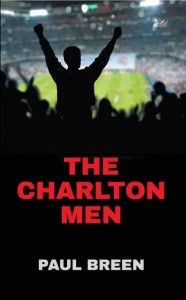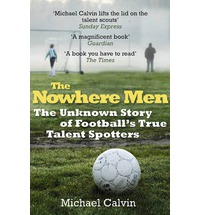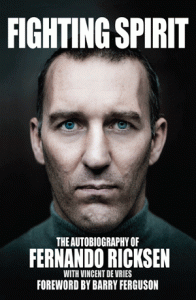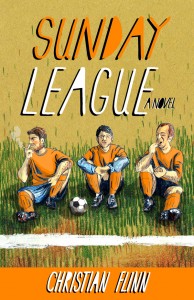Book Review: Johnny Cooper, Championship Manager: The Story of Mansfield Town FC 99/00 (according to Championship Manager) [Kindle edition] by Chris Darwen
 Right, let’s get the tacky cover out of the way at the outset. It’s not the best you will have seen. The long-winded title is clumsy and the author’s name is even missing – this blooper being quite probably a world’s first, yet at least you know what’s coming and it is pleasingly idiosyncratic. It’s not another empty biopic of one of the Premiership super-clubs,and therefore the reader senses that it is bound to be more personal and might even offer something a little different. But…why Mansfield Town? And what was so special about 1999 that merits a book in 2014? These mysteries, alas, are never explained.
Right, let’s get the tacky cover out of the way at the outset. It’s not the best you will have seen. The long-winded title is clumsy and the author’s name is even missing – this blooper being quite probably a world’s first, yet at least you know what’s coming and it is pleasingly idiosyncratic. It’s not another empty biopic of one of the Premiership super-clubs,and therefore the reader senses that it is bound to be more personal and might even offer something a little different. But…why Mansfield Town? And what was so special about 1999 that merits a book in 2014? These mysteries, alas, are never explained.
Chris Darwen’s Foreword admits it is a selfish act – ‘I had to write a book about it’ and confesses to it being an addiction before claiming there are millions like him. So he’s hoping they will relate to it and buy it. If he is right, he might eventually become a very wealthy man. Mind you, if his predictions in the persona of Mansfield’s Championship Manager are anything to go by, he might not become that wealthy a man. I suppose the e-punter is not risking much at £1.99 a Kindle copy.
The diary-form of narrative has the intention of letting us into the thought processes of Johnny Cooper and Darwen makes it clear his creation is no Jose Mourinho and has pretty much found his true level at Mansfield. You can also see the heavy influence of the computer game as so much of his time and thoughts are spent on wheeling and dealing in the (virtual) transfer market. Indeed, where the storytelling carries most authenticity is when it is closest to ‘Champ Man’ and Mansfield Town appears to be just the random club of choice for the author’s addiction.
Darwen quickly runs in to problems with the tone of the diary as he tries to create Johnny Cooper’s persona. For the football attitude he has taken a generous helping of Barry Fry, though Cooper is cast as a chipper Londoner with more than a hint of Del Boy about him and a tendency to think his jokes are hilarious. Since it is presented mostly as a diary and therefore not spontaneous wit, this comes across as self-congratulatory. I say ‘mostly’ because there are oddities in the narrative such as ‘I only play this game one way, and it isn’t with wingers I tell you!’ and ‘Let me talk you through the game’, where we have a mystery addressee.
The diary-form is both problematic and limiting, though, because it prevents full character development and leads to a narrowness with its episodic plot. Cooper’s ‘missus’ remains an ephemeral figure who occasionally merits fish and chips and his family life hardly garners a mention. So Cooper and the other creations never become three-dimensional people. This is a consequence of trying to fill out a computer game obsession. There is no doubt though that ‘Champ Man’ has gripped the author’s imagination and his enthusiasm comes over clearly in the accounts of the day-to-day running of the club especially his transfer dealings and frequent use of loanees and triallists.
A stylistic manifestation of the too-keen author’s addiction is his overdosing on exclamation marks, with trebles for really special emphasis, six in one (half) line illustrating the point.
For all that, the narrative rolls with undiminished enthusiasm from start to finish using all the expected football jargon; names being familiarised as in Blakey, Clarkey, Chrissy G and there always remains the possibility that his intended audience, his fellow addicts, might enjoy their fix.
Graeme Garvey
 As it currently stands, this should be called Asia’s World Cup Factbook as it is, in truth, a work still in progress. In order for it to become a ‘story’, it has to have a narrative with plot, setting and character. Aidan Williams has done a great deal of research and he gives a list of his main sources but it is not enough just to copy and paste all the information because the whole thing lacks an overriding argument that gives it a heart. Consequently, the reader (or reviewer) stumbles from one huge swathe of statistics to another. The nearest we come to being invited to engage with the humans involved is in his account of the North Koreans’ surprisingly successful progress in 1966. Therefore one presumes much credit must go for this to Tom Dunmore for his 2009 book North Korea’s Fairytale in the 1966 World Cup.
As it currently stands, this should be called Asia’s World Cup Factbook as it is, in truth, a work still in progress. In order for it to become a ‘story’, it has to have a narrative with plot, setting and character. Aidan Williams has done a great deal of research and he gives a list of his main sources but it is not enough just to copy and paste all the information because the whole thing lacks an overriding argument that gives it a heart. Consequently, the reader (or reviewer) stumbles from one huge swathe of statistics to another. The nearest we come to being invited to engage with the humans involved is in his account of the North Koreans’ surprisingly successful progress in 1966. Therefore one presumes much credit must go for this to Tom Dunmore for his 2009 book North Korea’s Fairytale in the 1966 World Cup. The Charlton Men by Paul Breen is the first part of a fictional trilogy set in South East London. Although this is classified as fiction, the backdrops to this first book are the real events of 2011 in terms of the London riots and Charlton Athletic FC’s 2011/12 season in League One.
The Charlton Men by Paul Breen is the first part of a fictional trilogy set in South East London. Although this is classified as fiction, the backdrops to this first book are the real events of 2011 in terms of the London riots and Charlton Athletic FC’s 2011/12 season in League One. As a child I was told by my parents that the word hate was a terrible one to direct at anyone or anything. As a result, to this day I have always associated the word as having a very dark edge and find it difficult to separate it from a language that is loaded with vile vitriol, anger and spite.
As a child I was told by my parents that the word hate was a terrible one to direct at anyone or anything. As a result, to this day I have always associated the word as having a very dark edge and find it difficult to separate it from a language that is loaded with vile vitriol, anger and spite. With the number of football books that are released each year, they have to focus on a unique topic or be very well written to stand out from the crowd. Michael Calvin’s The Nowhere Men ticks both these boxes.
With the number of football books that are released each year, they have to focus on a unique topic or be very well written to stand out from the crowd. Michael Calvin’s The Nowhere Men ticks both these boxes. From the cover of this book out stares Ricksen. It is a face known to the fans of Fortuna Sittard, AZ Alkmaar, Glasgow Rangers, Zenit St. Petersburg and the Dutch national side. It is a face that since late 2013 has started to shows sign of the terminal illness that is motor neurone disease (MND). This killer disease has started to attack his body so that his movement is increasingly affected as is his speech and his face now has a haunted, gaunt look.
From the cover of this book out stares Ricksen. It is a face known to the fans of Fortuna Sittard, AZ Alkmaar, Glasgow Rangers, Zenit St. Petersburg and the Dutch national side. It is a face that since late 2013 has started to shows sign of the terminal illness that is motor neurone disease (MND). This killer disease has started to attack his body so that his movement is increasingly affected as is his speech and his face now has a haunted, gaunt look. Martin Tracey’s Beneath the Floodlights belongs to that tiny category of fiction, Vampire Football. The mixing of these two very different genres makes it a difficult book to review by a website dedicated to football book reviews. Put simply, combining the two genres doesn’t work and from a football fan’s point of view that is because so much is of no real interest to them.
Martin Tracey’s Beneath the Floodlights belongs to that tiny category of fiction, Vampire Football. The mixing of these two very different genres makes it a difficult book to review by a website dedicated to football book reviews. Put simply, combining the two genres doesn’t work and from a football fan’s point of view that is because so much is of no real interest to them. It is twenty five years since the Hillsborough disaster and this year saw the beginning of fresh inquests after the original hearings were quashed. Of course the 96 victims who died and the hundreds injured in the tragedy, along with their friends and families have been the ones who have suffered the greatest loss and pain as a result of the events of 15 April 1989 in Sheffield. However, there is also another set of people who have had to deal with what they witnessed that day. These include all those who attended the game that day.
It is twenty five years since the Hillsborough disaster and this year saw the beginning of fresh inquests after the original hearings were quashed. Of course the 96 victims who died and the hundreds injured in the tragedy, along with their friends and families have been the ones who have suffered the greatest loss and pain as a result of the events of 15 April 1989 in Sheffield. However, there is also another set of people who have had to deal with what they witnessed that day. These include all those who attended the game that day. I’ll be totally honest and say that I knew nothing of Rabbi ‘Rab’ Howell before reading this book. If you search on the internet, Wikipedia details that he, “…was a nineteenth-century professional footballer who played for Sheffield United and Liverpool primarily as a defender. Born in Wincobank in Sheffield he was of Romani descent and was the first Romani to play for England, winning two caps…” His two caps came against Ireland in 1895, in which he scored in a 9-0 win and Scotland in 1899. His Wikipedia entry also states that, “…serious allegations were to be levelled at him…as in his final season at the club he was believed to have attempted to throw a game against rivals for the Championship Sunderland, scoring two blatant own goals. No charges were ever brought but Howell only played one more game for United before being quietly sold to Liverpool…”
I’ll be totally honest and say that I knew nothing of Rabbi ‘Rab’ Howell before reading this book. If you search on the internet, Wikipedia details that he, “…was a nineteenth-century professional footballer who played for Sheffield United and Liverpool primarily as a defender. Born in Wincobank in Sheffield he was of Romani descent and was the first Romani to play for England, winning two caps…” His two caps came against Ireland in 1895, in which he scored in a 9-0 win and Scotland in 1899. His Wikipedia entry also states that, “…serious allegations were to be levelled at him…as in his final season at the club he was believed to have attempted to throw a game against rivals for the Championship Sunderland, scoring two blatant own goals. No charges were ever brought but Howell only played one more game for United before being quietly sold to Liverpool…” The recent World Cup in Brazil showed what an incredible game football can be as it consistently produced stories that had they been predicted prior to the competition, would have been dismissed as pure fantasy.
The recent World Cup in Brazil showed what an incredible game football can be as it consistently produced stories that had they been predicted prior to the competition, would have been dismissed as pure fantasy.